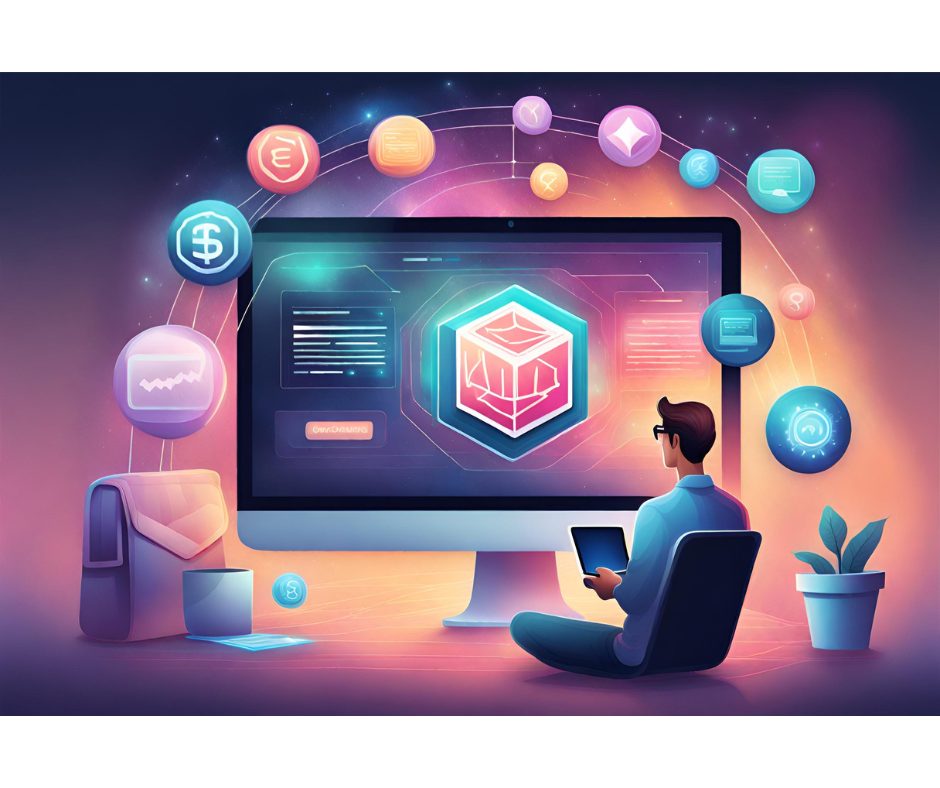Customer Relationship Management (CRM) software has become an essential tool for businesses looking to streamline their operations and enhance customer satisfaction. In this comprehensive guide, we will explore the evolution of CRM software, its benefits, and how to choose the right CRM platform for your business. So, let’s dive in and discover the world of CRM software.
What is CRM Software?
CRM stands for Customer Relationship Management. It refers to any tool, strategy, or process that helps businesses better organize and access customer data. In the early days, CRM involved handwritten notes and Rolodexes, but with the advent of digital technology, it has evolved into sophisticated databases stored on individual computers and, more recently, cloud-based CRM software.
A CRM system is a platform that connects different departments within an organization, such as marketing, sales, and customer service. It allows for the centralized storage of customer information, activities, and metrics, enabling seamless coordination and personalized customer journeys.
The History of CRM Software

CRM software has come a long way since its inception. It all started with handwritten notes and Rolodexes, where businesses manually recorded customer information. As technology advanced, businesses began using individual computer databases to store customer data. This marked the beginning of the digital era of CRM.
With the rise of the internet and cloud computing, CRM software became more accessible and scalable. It allowed businesses of all sizes to benefit from the power of CRM, resulting in increased leads, sales revenue, and customer retention.
The Benefits of CRM Software

Implementing CRM software offers numerous benefits for businesses. Let’s explore some of the key advantages:
1. Centralized Customer Data
CRM software provides businesses with a centralized database for storing customer information. This allows employees from different departments to access and update customer data in real-time. Having a single source of truth ensures consistency and accuracy in customer interactions.
2. Improved Customer Relationships
By having a comprehensive view of customer data, businesses can personalize their interactions and provide tailored solutions. CRM software enables businesses to track customer preferences, purchase history, and communication history, helping them build stronger relationships and enhance customer satisfaction.
3. Streamlined Sales Processes
CRM software streamlines the sales process by automating repetitive tasks, such as data entry and lead management. It provides sales teams with valuable insights, enabling them to prioritize leads, track sales opportunities, and forecast revenue. This results in increased productivity and efficiency.
4. Enhanced Marketing Campaigns
CRM software allows businesses to segment their customer base and target specific groups with personalized marketing campaigns. By analyzing customer data, businesses can create targeted marketing messages, improving campaign effectiveness and return on investment.
5. Improved Customer Service
With CRM software, businesses can provide better customer service by quickly accessing customer information and history. This enables customer service representatives to address inquiries and resolve issues promptly, leading to higher customer satisfaction and loyalty.
6. Data Analytics and Reporting
CRM software provides robust analytics and reporting capabilities, allowing businesses to gain valuable insights into their customers’ behavior, preferences, and buying patterns. These insights help businesses make data-driven decisions, identify trends, and optimize their strategies.
Choosing the Right CRM Software

Selecting the right CRM software for your business can be a daunting task. Consider the following factors when making your decision:
1. Scalability
Choose a CRM software that can scale with your business as it grows. Consider the number of users, data storage capacity, and the ability to integrate with other applications.
2. Ease of Use
Look for a CRM software with a user-friendly interface that is easy to navigate and requires minimal training. This ensures that your team can quickly adapt to the new system and maximize its potential.
3. Customization Options
Consider the level of customization offered by the CRM software. Look for features that can be tailored to your specific business needs, such as customizable fields, workflows, and reports.
4. Integration Capabilities
Ensure that the CRM software seamlessly integrates with other tools and systems your business relies on, such as email marketing platforms, e-commerce platforms, and customer support software. This enables smooth data flow and eliminates manual data entry.
5. Mobile Accessibility
In today’s mobile-driven world, it is essential to choose a CRM software that offers mobile accessibility. This allows your team to access customer data and perform tasks on the go, enhancing productivity and responsiveness.
6. Security and Compliance
Data security is crucial when it comes to CRM software. Ensure that the software you choose offers robust security measures, such as encryption and access controls. Additionally, consider any industry-specific compliance requirements that may apply to your business.
The Future of CRM Software
CRM software continues to evolve, driven by advancements in technology and changing customer expectations. Here are some trends that are shaping the future of CRM:
1. Artificial Intelligence and Automation
AI-powered features, such as chatbots and predictive analytics, are becoming increasingly prevalent in CRM software. These capabilities enable businesses to automate repetitive tasks, personalize customer interactions, and make data-driven decisions.
2. Omnichannel Customer Engagement
Customers now interact with businesses through multiple channels, including social media, email, and live chat. CRM software is evolving to provide a unified view of customer interactions across all channels, enabling businesses to deliver consistent and personalized experiences.
3. Integration with Other Business Systems
CRM software is integrating with other business systems, such as ERP (Enterprise Resource Planning) and marketing automation platforms. This integration allows for seamless data flow, providing a holistic view of customer interactions and enabling more efficient business processes.
4. Mobile-First Approach
As mobile usage continues to grow, CRM software is prioritizing mobile accessibility and user experience. Mobile CRM apps are becoming more robust, offering features that allow sales teams to work effectively from anywhere, at any time.
30 Popular CRM Software in 2024
- Salesforce: A leading CRM software that offers cloud-based solutions for sales, service, marketing, and more, making it suitable for businesses of all sizes seeking comprehensive customer management and engagement tools.
- HubSpot CRM: A free, user-friendly CRM that integrates with HubSpot’s marketing, sales, and service software, ideal for small to medium-sized businesses wanting to grow their customer base without heavy upfront costs.
- Zoho CRM: Offers a comprehensive suite of online productivity tools and SaaS applications, including an easy-to-use CRM that’s great for businesses looking for an affordable, scalable solution.
- Microsoft Dynamics 365: A suite of enterprise-level applications, including CRM functionalities that integrate seamlessly with other Microsoft products, suitable for larger organizations needing a wide range of business process management tools.
- Oracle NetSuite CRM: Part of Oracle’s suite of cloud services, providing businesses with a powerful CRM solution that includes sales force automation, customer service management, and marketing automation.
- SAP CRM: Part of the SAP Business Suite, offering end-to-end CRM processes for large enterprises, including marketing, sales, services, and customer interaction management.
- Pipedrive: A sales-focused CRM designed to make visual sales pipelines intuitive, helping sales teams manage intricate sales processes efficiently.
- Freshsales: A dynamic CRM by Freshworks designed for high-velocity sales teams, offering AI-based lead scoring, built-in phone, email, activity capture, and more.
- Insightly: A CRM and project management software that’s great for small to medium-sized businesses, offering features for managing leads, contacts, organizations, partners, vendors, and suppliers.
- SugarCRM: Offers a customizable CRM platform to automate sales, marketing, and service processes, suitable for mid-sized to large enterprises.
- Keap (formerly Infusionsoft): Best known for its marketing automation capabilities combined with a robust CRM, ideal for small businesses looking to grow their sales and marketing efforts.
- Nimble: A simple, social media-integrated CRM designed for small businesses, focusing on managing relationships across social networks.
- SalesforceIQ (formerly RelateIQ): A CRM application designed to simplify relationship management with intelligent, data-driven features, now part of Salesforce’s suite of products.
- vTiger CRM: An open-source CRM software offering sales, marketing, and help desk solutions, suitable for small to medium-sized businesses.
- Act!: Combines CRM with marketing automation, providing small businesses with the tools to manage customer relationships and grow their business.
- Copper (formerly ProsperWorks): A CRM designed specifically for integration with Google Workspace, making it an excellent choice for businesses heavily invested in Google’s ecosystem.
- Agile CRM: An all-in-one CRM with sales, marketing, and service automation in a single platform, tailored for small to mid-sized businesses.
- Streak CRM for Gmail: A simple CRM integrated directly into Gmail, ideal for individuals and small teams who manage their business from their inbox.
- Zendesk Sell (formerly Base CRM): Focuses on enhancing productivity, processes, and pipeline visibility for sales teams.
- Apptivo: An affordable, customizable CRM that offers a wide range of apps covering sales, marketing, and service needs for small to medium-sized businesses.
- Capsule CRM: Known for its simplicity and ease of use, providing small businesses with the basics for managing their sales pipeline and customer relationships.
- Close: A CRM aimed at helping inside sales teams close more deals, with strong communication features integrated directly into the platform.
- Highrise: Offers simple contact and task management to help small businesses stay organized with a minimal learning curve.
- Less Annoying CRM: Designed specifically to be easy to use, focusing on providing small businesses with basic CRM functionalities without the complexity.
- Workbooks: A UK-based CRM offering a comprehensive suite of tools for sales, marketing, and customer support, aimed at mid-sized companies.
- PipelineDeals: Provides sales engagement and CRM software to help businesses increase productivity and close more deals.
- Bpm’online CRM (now Creatio): Offers process-driven CRM for marketing, sales, and service, helping businesses streamline customer engagements.
- OnePageCRM: Converts the complexity of CRM into a simple to-do list, enabling sales teams to capture leads, follow up, and close deals.
- Bitrix24: A collaboration platform with a built-in CRM, providing a suite of tools for communication, task management, and customer relationship management.
- HoneyBook: Tailored for freelancers and small business owners, focusing on client flow management, from inquiry to payment, making it ideal for service-based professionals.
Each CRM software has its unique strengths, targeting different business sizes, industries, and needs. Whether you’re looking for a solution that offers deep customization, integrates with your current tech stack, or provides specific sales and marketing tools, there’s likely a CRM out there that fits your requirements.
Customizing CRM to Fit Your Business Needs
Implementing a Customer Relationship Management (CRM) system is a transformative step for any business, but the real magic happens when you customize your CRM to align perfectly with your operational needs and objectives. Customization ensures that the CRM software not only integrates seamlessly into your existing workflows but also enhances them, making it a pivotal section to explore in our comprehensive guide.
Identifying Unique Business Requirements
Before diving into customization options, it’s crucial to identify your unique business requirements. This involves understanding your sales process, marketing strategies, customer service protocols, and any industry-specific needs. Customization can range from simple adjustments, like custom fields to track unique customer information, to complex automation rules that streamline your entire sales process.
Leveraging Custom Fields and Workflows
Most CRM platforms offer the ability to create custom fields, allowing you to capture specific information that’s relevant to your business. Whether it’s industry-specific data, customer preferences, or unique project identifiers, custom fields ensure that your CRM contains all the information your team needs to make informed decisions.
Custom workflows are another powerful customization tool. By automating repetitive tasks and defining specific triggers for certain actions, workflows can significantly increase efficiency. For instance, you could set up a workflow that automatically sends a welcome email when a new contact is added to the CRM or one that assigns tasks to team members when a deal reaches a certain stage.
Integrating with Other Tools
Integration capabilities are a cornerstone of effective CRM customization. The ability to integrate your CRM with other tools and platforms — such as email marketing software, social media platforms, accounting systems, and e-commerce solutions — creates a unified technology ecosystem that enhances productivity and data consistency.
Personalization for Enhanced Customer Experience
Customization also plays a vital role in personalizing the customer experience. By using the data captured in your CRM, you can tailor communications and offers to meet the specific needs and preferences of individual customers. This level of personalization can significantly improve customer satisfaction and loyalty.
Training and User Adoption
Customizing your CRM also involves ensuring that your team is fully trained and comfortable with the system. User adoption is critical to the success of any CRM implementation, and customization can sometimes add complexity. Providing comprehensive training and ongoing support ensures that your team can effectively use the customized features of the CRM.
Security and Access Controls
Customizing your CRM also means setting up appropriate security measures and access controls. This ensures that sensitive information is protected and that team members can only access data relevant to their roles. Customization can help enforce data security protocols by restricting access to certain fields, records, or modules within the CRM.
Continuous Evaluation and Adaptation
Finally, customization is not a one-time task but an ongoing process. As your business evolves, so too will your CRM needs. Regularly reviewing and updating your CRM customizations ensures that the system continues to meet your business requirements effectively.
Conclusion
CRM software has revolutionized the way businesses manage customer relationships. From handwritten notes to sophisticated cloud-based platforms, CRM software provides businesses with the tools they need to streamline operations, enhance customer satisfaction, and drive growth. By choosing the right CRM software and staying abreast of emerging trends, businesses can stay ahead of the competition and deliver exceptional customer experiences.
Remember, CRM software is not just a technology solution—it’s a strategic asset that empowers businesses to build stronger customer relationships and drive long-term success. So, embrace the power of CRM software and unlock its potential for your business.
CRM FAQs
What Is a CRM Software?
CRM software, or Customer Relationship Management software, is a tool that helps businesses manage, analyze, and improve their interactions with current and potential customers. It centralizes customer information, tracks interactions, and automates various marketing, sales, and customer service processes. This enables businesses to foster better customer relationships, leading to increased loyalty and sales.
What Is an Example of a CRM Software?
An example of CRM software is Salesforce, known for its comprehensive features that cater to sales, marketing, and customer service needs. Salesforce allows businesses to manage customer interactions, track sales leads, execute marketing campaigns, and provide post-sale support, all from a single platform.
What Are the 3 Types of CRM?
The three main types of CRM are:
- Operational CRM: Focuses on automating and improving business processes in marketing, sales, and service.
- Analytical CRM: Concentrates on analyzing customer data to make informed business decisions and improve customer satisfaction.
- Collaborative CRM: Aims to enhance communication and collaboration among businesses and their stakeholders, including suppliers, distributors, and customers, to offer better service.
What Is the Most Popular CRM?
Salesforce is often considered the most popular CRM due to its extensive features, scalability, and wide adoption across industries. It offers a comprehensive suite of services that cater to various aspects of customer relationship management.
What Is the Number 1 CRM in the World?
Salesforce is widely recognized as the number 1 CRM in the world, holding a significant market share and praised for its versatility, cloud-based platform, and extensive ecosystem of third-party apps.
What Is the Number One CRM System?
Salesforce is commonly cited as the number one CRM system, thanks to its robust features, flexibility, and comprehensive approach to managing customer relationships across sales, service, marketing, and more.
Why Is Salesforce so Popular?
Salesforce’s popularity stems from its user-friendly interface, customizable features, and cloud-based system that allows for access anywhere, anytime. Its extensive ecosystem, including a vast array of apps available on its AppExchange, enables businesses to tailor the system to their specific needs. Salesforce’s commitment to innovation and regularly updated features also contribute to its popularity.
Does Microsoft Have CRM?
Yes, Microsoft offers a CRM solution called Microsoft Dynamics 365. It is a suite of enterprise resource planning (ERP) and customer relationship management (CRM) applications that help businesses manage and analyze customer interactions and data throughout the customer lifecycle.
Is It Hard to Learn CRM?
The difficulty of learning CRM software depends on the complexity of the system and the user’s familiarity with such platforms. Basic CRM functionalities can be intuitive for most users, especially with user-friendly systems like Salesforce or HubSpot. However, mastering advanced features and customization may require dedicated training and practice. Fortunately, most CRM providers offer extensive resources, tutorials, and support to help users learn their systems.
Featured Image Credit: Photo by Obi – @pixel8propix; Unsplash – Thank you!









